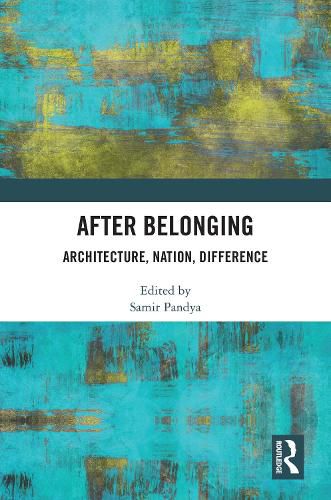Readings Newsletter
Become a Readings Member to make your shopping experience even easier.
Sign in or sign up for free!
You’re not far away from qualifying for FREE standard shipping within Australia
You’ve qualified for FREE standard shipping within Australia
The cart is loading…






This book breaks new ground in demystifying the relationship between architecture, nationhood, and other forms of collective identity. It attempts to extricate the oppressive ideology of national identity entrenched within the very idea of architecture. Authors investigate themes such as cosmopolitanism, diaspora, geopolitics, globalisation, hybridity, and race. Certain chapters expose highly regulated environments which support cultural hegemony, such as the context of a hostel for ‘coloured colonial seamen’ in London, the illusionary rhetoric of ‘authenticity’ used to legitimise architectural conservation, and the role of the mosque as mediator between a post-war, multi-racial Britain and ideas of nationhood. Others engage subjects at the urban scale, including the phenomena of universities transcending their nation-building roots to become agents of cosmopolitan urbanism, and how the discursive context of a high-profile yet unrealised modernist office-block in the City of London sustained a culture of British faux-nationalism. Remaining chapters adopt a postcolonial lens, with one examining how particular works of literary fiction reimagine notions of ‘place’ within an emerging intercultural nation, and another exploring the tense relationship between identitarian form and affective atmospheres to suggest the possibility of anti-essentialist experiences of architecture.
Together, these perspectives propose an alternative vision of the City, where neither state-sponsored identity politics nor right-wing populism determine the cultural context within which architects design for our collective urban experience. This book will be of interest to researchers and advanced students of Architecture, Anthropology, History, Human Geography, Politics, Sociology, and Urban Studies. The chapters included here were first published in the journal, National Identities.
$9.00 standard shipping within Australia
FREE standard shipping within Australia for orders over $100.00
Express & International shipping calculated at checkout
This book breaks new ground in demystifying the relationship between architecture, nationhood, and other forms of collective identity. It attempts to extricate the oppressive ideology of national identity entrenched within the very idea of architecture. Authors investigate themes such as cosmopolitanism, diaspora, geopolitics, globalisation, hybridity, and race. Certain chapters expose highly regulated environments which support cultural hegemony, such as the context of a hostel for ‘coloured colonial seamen’ in London, the illusionary rhetoric of ‘authenticity’ used to legitimise architectural conservation, and the role of the mosque as mediator between a post-war, multi-racial Britain and ideas of nationhood. Others engage subjects at the urban scale, including the phenomena of universities transcending their nation-building roots to become agents of cosmopolitan urbanism, and how the discursive context of a high-profile yet unrealised modernist office-block in the City of London sustained a culture of British faux-nationalism. Remaining chapters adopt a postcolonial lens, with one examining how particular works of literary fiction reimagine notions of ‘place’ within an emerging intercultural nation, and another exploring the tense relationship between identitarian form and affective atmospheres to suggest the possibility of anti-essentialist experiences of architecture.
Together, these perspectives propose an alternative vision of the City, where neither state-sponsored identity politics nor right-wing populism determine the cultural context within which architects design for our collective urban experience. This book will be of interest to researchers and advanced students of Architecture, Anthropology, History, Human Geography, Politics, Sociology, and Urban Studies. The chapters included here were first published in the journal, National Identities.